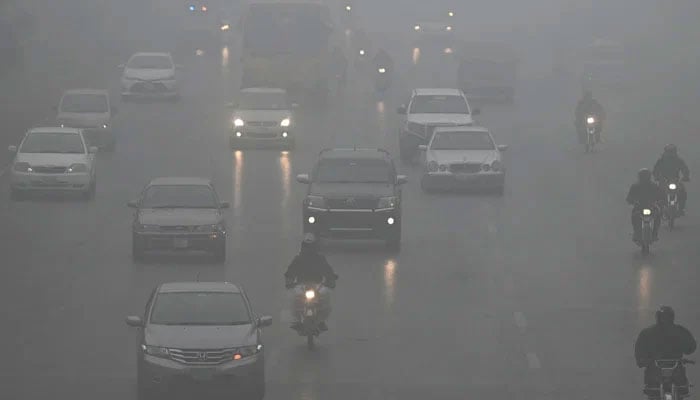No smog monitoring system in Faisalabad
With population exceeding 9m and thousands of factories, air pollution in Faisalabad has become critical issue
FAISALABAD: One of Pakistan’s major industrial hub and the second largest city in Punjab by population, currently lacks a government operated air quality monitoring system to measure air pollution and smog levels.
With a population exceeding 9 million and thousands of factories that emit smoke and discharge chemical-laden wastewater, air pollution in Faisalabad has become a critical issue.
A few years ago, the district administration announced plans to install air quality monitors at five locations across the city. However, only two monitors were set up, one at the Chenab Club and another at the Faisalabad Chamber of Commerce.
Due to worsening smog conditions, the air quality monitor at Chenab Club has since been removed, and the one at the Chamber of Commerce is currently inactive.
Until recently, when the Chenab Club monitor was operational, it recorded an air quality index (AQI) between 250 and 300, indicating highly hazardous air conditions.
At present, government agencies, the media, and residents rely on a single international monitor, which often experiences technical issues.
Consequently, much of Faisalabad’s air quality data is based on estimates and rarely reflects the true severity of the smog. The rising intensity of air pollution in Faisalabad is evident from the thick haze blanketing the city.
Within the iconic Clock Tower area, visibility is so poor that the tower is barely visible from just a few meters away. Pedestrians and office workers alike experience eye irritation even indoors, underscoring the need for immediate and reliable air quality monitoring solutions.
-
 Trump Revokes Legal Basis For US Climate Regulation, Curb Vehicle Emission Standards
Trump Revokes Legal Basis For US Climate Regulation, Curb Vehicle Emission Standards -
 DOJ Blocks Trump Administration From Cutting $600M In Public Health Funds
DOJ Blocks Trump Administration From Cutting $600M In Public Health Funds -
 2026 Winter Olympics Men Figure Skating: Malinin Eyes Quadruple Axel, After Banned Backflip
2026 Winter Olympics Men Figure Skating: Malinin Eyes Quadruple Axel, After Banned Backflip -
 Scientists Find Strange Solar System That Breaks Planet Formation Rules
Scientists Find Strange Solar System That Breaks Planet Formation Rules -
 Meghan Markle Rallies Behind Brooklyn Beckham Amid Explosive Family Drama
Meghan Markle Rallies Behind Brooklyn Beckham Amid Explosive Family Drama -
 Backstreet Boys Voice Desire To Headline 2027's Super Bowl Halftime Show
Backstreet Boys Voice Desire To Headline 2027's Super Bowl Halftime Show -
 OpenAI Accuses China’s DeepSeek Of Replicating US Models To Train Its AI
OpenAI Accuses China’s DeepSeek Of Replicating US Models To Train Its AI -
 Woman Calls Press ‘vultures’ Outside Nancy Guthrie’s Home After Tense Standoff
Woman Calls Press ‘vultures’ Outside Nancy Guthrie’s Home After Tense Standoff -
 Allison Holker Gets Engaged To Adam Edmunds After Two Years Of Dating
Allison Holker Gets Engaged To Adam Edmunds After Two Years Of Dating -
 Prince William Prioritises Monarchy’s Future Over Family Ties In Andrew Crisis
Prince William Prioritises Monarchy’s Future Over Family Ties In Andrew Crisis -
 Timothée Chalamet Turns Head On The 'show With Good Lighting'
Timothée Chalamet Turns Head On The 'show With Good Lighting' -
 Bucks Vs Thunder: Nikola Topic Makes NBA Debut As Milwaukee Wins Big
Bucks Vs Thunder: Nikola Topic Makes NBA Debut As Milwaukee Wins Big -
 King Charles Breaks 'never Complain, Never Explain' Rule Over Andrew's £12 Million Problem
King Charles Breaks 'never Complain, Never Explain' Rule Over Andrew's £12 Million Problem -
 Casey Wasserman To Remain LA Olympics Chair Despite Ghislaine Maxwell Ties
Casey Wasserman To Remain LA Olympics Chair Despite Ghislaine Maxwell Ties -
 Shaun White Is Back At The Olympics But Not Competing: Here’s Why
Shaun White Is Back At The Olympics But Not Competing: Here’s Why -
 Breezy Johnson Engaged At Olympics After Emotional Finish Line Proposal
Breezy Johnson Engaged At Olympics After Emotional Finish Line Proposal




